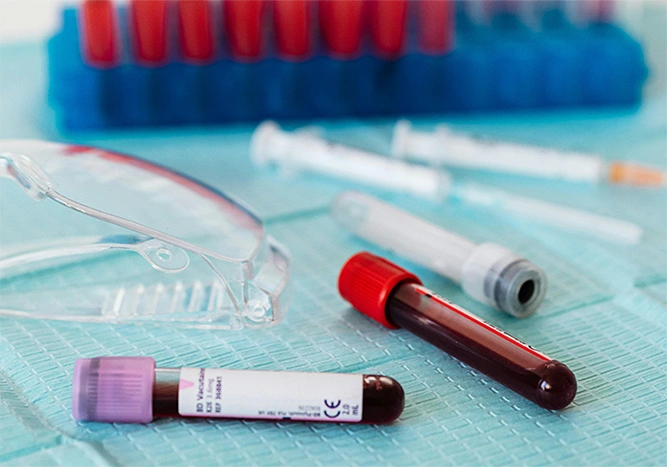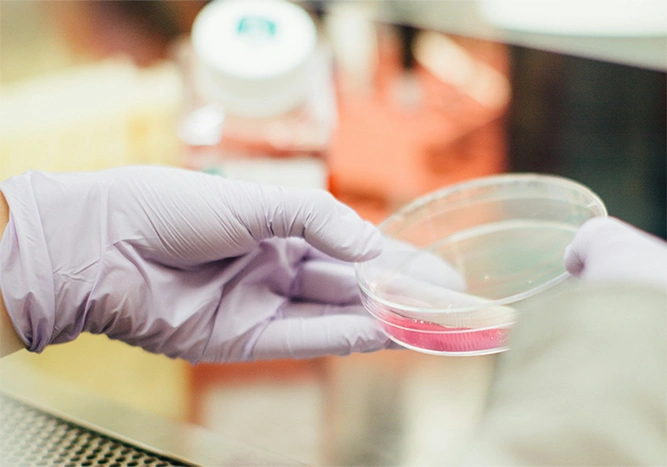Laboratory
NIBD Laboratory
The Laboratory Department at NIBD is a pivotal component of our institution, providing essential diagnostic and investigative services to support the diagnosis, treatment, and monitoring of haematological and oncological conditions. As part of the NIBD Lab, our facilities are equipped to ensure accuracy, reliability, and efficiency in every test.
Our laboratories are staffed by highly skilled technicians, technologists, and scientists who are dedicated to delivering accurate and timely results while adhering to the highest standards of quality and safety.


1. Haematology
The Hematology Laboratory specialises in the analysis of blood and blood-forming tissues, providing vital information for the diagnosis and management of various blood disorders, including:
- Complete Blood Count (CBC): Analysing the cellular components of blood, including red blood cells, white blood cells, and platelets.
- Coagulation Studies: Assessing blood clotting function through tests such as prothrombin time (PT), activated partial thromboplastin time (APTT), and fibrinogen levels.
- Peripheral Blood Smears: Microscopic examination of blood smears to detect abnormalities in blood cell morphology.
2. Clinical Chemistry
The Clinical Chemistry Laboratory performs a wide range of biochemical analyses on blood and other body fluids, providing valuable information about metabolic and organ function, including:
- Liver Function Tests: Assessing liver enzymes, bilirubin levels, and other markers of liver function.
- Renal Function Tests: Measuring markers such as creatinine and urea to assess kidney function.
- Electrolyte and Mineral Analysis: Evaluating levels of sodium, potassium, calcium, and other electrolytes.
- Lipid Profile: Assessing cholesterol, triglycerides, and other lipid markers for cardiovascular risk assessment.
3. Molecular Diagnostics
The Molecular Diagnostics Laboratory employs advanced molecular techniques to detect genetic mutations, biomarkers, and infectious agents, including:
- Genetic Testing: Analysing DNA and RNA for mutations associated with hereditary disorders, cancer predisposition, and pharmacogenetics.
- Quantitative PCR: Quantifying gene expression levels and viral load in various diseases, including leukaemia, lymphoma, and infectious diseases.
4. Immunohematology (Blood Bank)
The Immunohematology Laboratory, commonly known as the Blood Bank, is responsible for the collection, processing, and storage of blood products, as well as compatibility testing for transfusion purposes, including:
- Blood Typing and Crossmatching: Determining ABO and Rh blood types and performing compatibility testing between donor and recipient blood samples to prevent transfusion reactions.
- Component Preparation: Processing whole blood donations into various blood components such as packed red blood cells, platelets, and fresh frozen plasma.
- Transfusion Support: Providing blood products and support services for transfusion therapy, including emergency and therapeutic apheresis procedures.
5. Cytogenetics
The Cytogenetics Laboratory specialises in the analysis of chromosomal abnormalities and genetic disorders, playing a critical role in the diagnosis and prognosis of various malignancies and congenital conditions, including:
- Karyotyping: Visualizing and analysing the chromosomal structure and number from cultured cells, identifying numerical and structural abnormalities.
- Fluorescence In Situ Hybridization (FISH): Using fluorescent probes to detect specific chromosomal abnormalities and genetic rearrangements associated with haematological malignancies such as leukaemia and lymphoma.
- Microarray Analysis: High-resolution genomic profiling to detect copy number variations and chromosomal imbalances in cancer and genetic syndromes.
6. Flow Cytometry
The Flow Cytometry Laboratory utilises flow cytometric analysis to characterise and quantify cellular populations based on their immunophenotypic markers, facilitating the diagnosis and monitoring of haematological malignancies and immune disorders.
7. Mass Spectrometry
The Mass Spectrometry Laboratory employs mass spectrometry techniques for the quantitative analysis of small molecules and biomarkers, supporting clinical and research applications in areas such as drug monitoring, metabolic disorders, and proteomics.
8. Bone Marrow Evaluation
The Bone Marrow Evaluation Laboratory focuses on the analysis of bone marrow samples obtained through aspiration and biopsy procedures, providing critical information for the diagnosis and management of various haematological disorders, including:
- Bone Marrow Aspiration and Biopsy: Collecting bone marrow samples for examination, including assessment of cellularity, morphology, and presence of abnormal cells.
- Bone Marrow Morphology: Microscopic examination of bone marrow smears and biopsy specimens to assess the cellular composition, including the presence of hematopoietic cells, abnormal cell infiltrates, and fibrosis.
- Immunohistochemistry and Special Stains: Utilising immunohistochemical markers and special stains to characterise cell populations and identify specific abnormalities, such as blasts, lymphoid aggregates, and reticulin fibrosis.
- Flow Cytometry on Bone Marrow Aspirate: Flow cytometric analysis of bone marrow aspirate samples to assess the immunophenotypic profile of hematopoietic cells, aiding in the diagnosis of leukaemia, lymphoma, and other haematological malignancies.
9. 3D Hematology Testing
The 3D Hematology Testing Laboratory utilises advanced three-dimensional (3D) imaging techniques and computational analysis to provide enhanced visualisation and quantitative assessment of blood cell morphology, facilitating the diagnosis and monitoring of haematological disorders, including:
- Automated Blood Cell Imaging: Utilising digital microscopy and image analysis algorithms to generate high-resolution, three-dimensional reconstructions of blood cell morphology.
- Quantitative Morphological Analysis: Extracting quantitative parameters such as cell size, shape, nuclear-cytoplasmic ratio, and cellular granularity from 3D images to identify subtle abnormalities indicative of haematological diseases.
- Integration with Diagnostic Workflow: Integrating 3D haematology testing into routine laboratory workflows to provide rapid and accurate diagnosis, improve diagnostic accuracy, and enhance patient care outcomes.
10. Tele Morphology
The Telepathology Service utilises digital imaging and telecommunications technology to enable remote consultation and interpretation of peripheral smears, facilitating collaboration and expert consultation with haematologists for timely diagnosis and treatment planning.
11. Clinical Genomics
The Clinical Genomics Laboratory offers comprehensive genomic profiling services, including Sanger sequencing, to identify genetic mutations, gene fusions, and other molecular alterations associated with haematological malignancies and inherited disorders, guiding personalised treatment strategies and clinical decision-making.
This entire spectrum of services is carried out with the highest standards at the NIBD lab, ensuring accuracy, reliability, and excellence. We continuously update its methodologies and technologies to maintain its position at the forefront of haematology diagnostics.
© 2026 Medikaid. All rights reserved — Made by DeoThemes

